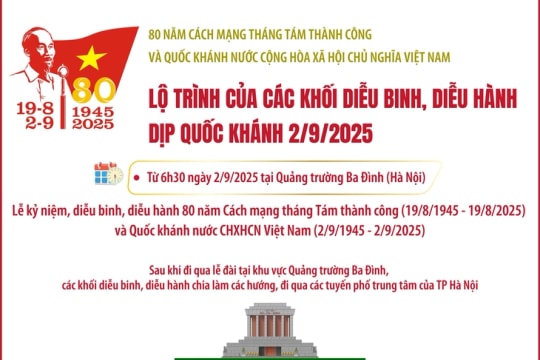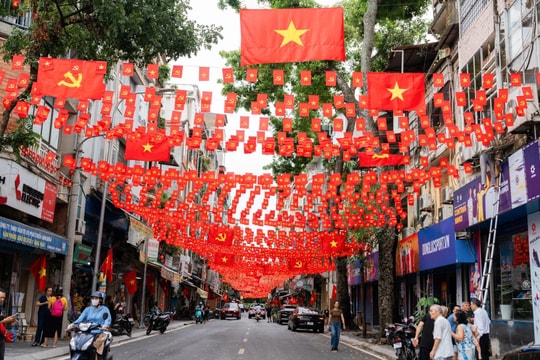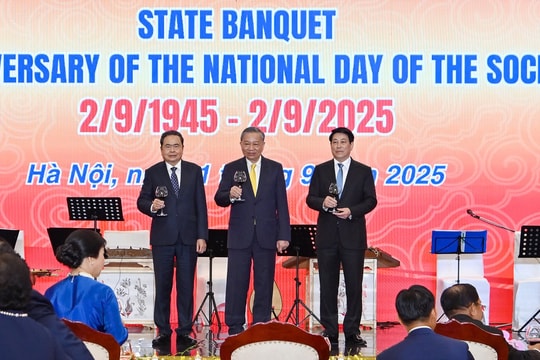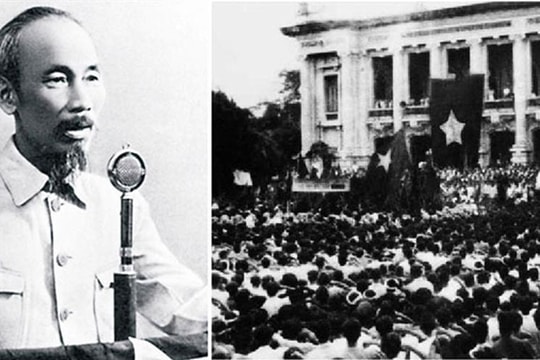The Declaration of Independence and priceless spiritual treasures of the Vietnamese people
Not only affirming the right to national independence on the international level, the Declaration of Independence is also the sacred voice of patriotism and compatriotism - priceless spiritual treasures of the Vietnamese people.
The success of the August Revolution in 1945, for the first time, transformed our people from slaves into masters of the country, masters of their own destiny, wrote the most glorious page of history, and brought the nation into a new era - the era of national independence associated with socialism.
On September 2, 1945, at the historic Ba Dinh Square, President Ho Chi Minh, on behalf of the Provisional Government of the Democratic Republic of Vietnam, solemnly read the Declaration of Independence, announcing to the people of the whole country and the world the birth of the Democratic Republic of Vietnam (now the Socialist Republic of Vietnam).
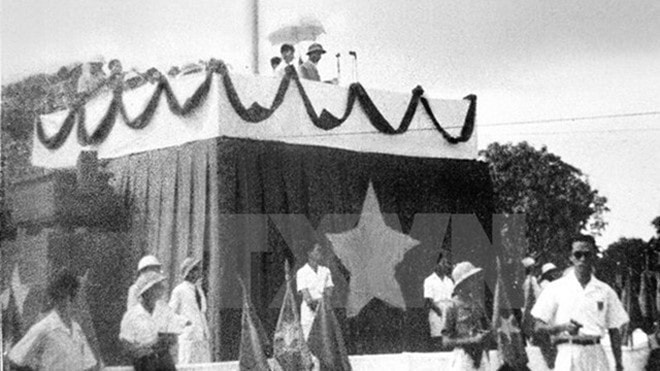
Not only affirming the right to national independence on the international level, the Declaration of Independence is also the sacred voice of patriotism and compatriotism - priceless spiritual treasures of the Vietnamese people.
Crystallization of Vietnamese patriotic tradition
The Declaration of Independence of the first democratic, republican, and rule-of-law State in Asia is only over 1,000 words long, but was pondered and written by Ho Chi Minh - the leading soldier in the cause of national liberation."after many years of wandering around the world, carrying a death sentence from the French empire, going through dozens of prisons and long days of sleeping on the ground and in the dew"[1]. Therefore, this historical document not only has profound legal and political value, but is also a noble symbol of revolutionary humanism.
In that document, patriotism went beyond the limits of emotions, was expressed in righteous language, affirmed by the nation's historical tradition and demonstrated by the actions of the entire Vietnamese people in the August Revolution of 1945.
The birth of the Democratic Republic of Vietnam was the result of the awakening and promotion of the tradition of ardent patriotism, indomitable spirit, sense of independence, self-reliance and endless endogenous strength of the entire Vietnamese people under the light of Marxism-Leninism and Ho Chi Minh thought.
The patriotism in the Declaration of Independence is not only a pure sentiment, but also a manifestation of profound political courage. Ho Chi Minh's political courage is clearly shown in that he not only declared independence for the Vietnamese nation but also affirmed the legitimate position of the Vietnamese nation in the international arena through legal language and human rights ideology. From there, patriotism was elevated to an ideal of the times, both imbued with national identity and in harmony with the pulse of humanity.
At the beginning of the declaration, Ho Chi Minh quoted verbatim from the 1776 American Declaration of Independence and the 1789 French Revolution Declaration of the Rights of Man and of the Citizen:“All men are created equal. They are endowed by their Creator with certain unalienable rights, among these are life, liberty, and the pursuit of happiness.” “Men are born free and with equal rights, and must always remain free and with equal rights.”[2].
Ho Chi Minh took the golden words "immortal", "irrefutable truths"of the great powers to prove the legitimate independence of the Vietnamese people - a people once considered"weak and small"", oppressed and excluded from the world political chessboard.
Citing these two declarations is not simply praising Western democratic ideology but is a sharp argumentative strategy of a patriotic politician with a good understanding of global politics, as Professor Tran Van Giau commented:"President Ho Chi Minh used the arguments of the great powers to prove the legitimate independence of the Vietnamese people. That is a way to show patriotism with intelligence and international spirit"[3].
In the next part, the Declaration of Independence clearly states that the Vietnamese people have long refused to submit to foreign powers, continuously carrying out uprisings and people's wars to regain independence.
Ho Chi Minh affirmed:"The truth is that our people took back Vietnam from the Japanese, not from the French"[4].That statement not only aims to refute the French colonialists’ demand to reoccupy our country, but also affirms that political sovereignty belongs to the people - a strategic argument that demonstrates justice and deep patriotism. Patriotism here is no longer just the affirmation of sovereignty, but the protection of national honor by global justice, thereby reclaiming a worthy position for Vietnam - a nation that was once despised, oppressed and excluded from the world political chessboard.
In the final part of the Declaration, Ho Chi Minh affirmed:“A nation that has courageously fought against French slavery for more than 80 years, a nation that has courageously stood with the Allies against fascism for several years, that nation must be free! That nation must be independent!”[5].
The sentence is constructed according to a repetitive structure, emphasizing the argument from historical practice: patriotism is not through words but through actions, blood and sacrifice, through more than 80 years of resistance of the entire people. By emphasizing the"grit"and"sacrifice"Ho Chi Minh not only recounted history, but also used history to affirm Vietnam's righteousness before the whole world. This created the just value for the resistance war to protect independence that followed.
After the declaration was published, throughout September 1945, millions of Vietnamese people from North to South, from urban to rural areas took to the streets to rally and participate in the revolutionary government. Patriotism was aroused not only by emotions, but also by faith in justice and determination to maintain the newly won independence, which then turned into vibrant and powerful revolutionary movements.
It was a popular education movement with the miracle of only one year (August 19, 1945 - August 19, 1946) when 2.5 million people in the North and North Central regions escaped illiteracy.
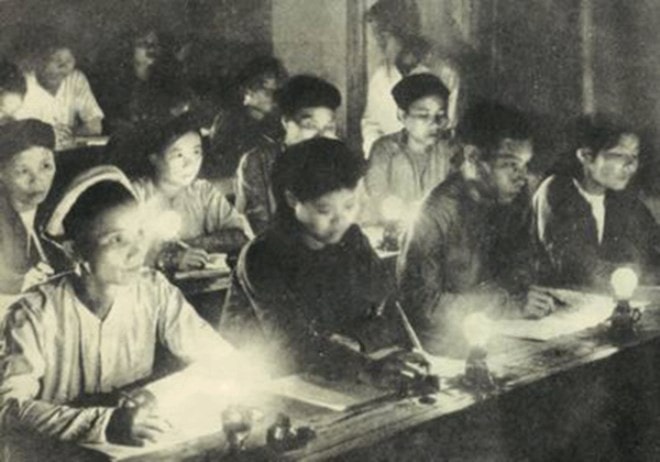
From the wise and timely leadership of President Ho Chi Minh, with the patriotism and determination of the people not to let "an ignorant nation be a weak nation", Popular Education quickly became the most vibrant revolutionary movement when the government was still very young, bringing our people from a place of more than 95% illiteracy to a cultured and scientific nation, capable of preserving the independence and freedom of the country.
The “Golden Week” movement (from September 17 to 24, 1945) supporting the revolutionary government, voluntarily donating gold, money and objects to the State was also a vivid and concrete expression showing that patriotism in the Declaration of Independence was not a slogan, but a driving force that transformed into revolutionary action for the entire people.
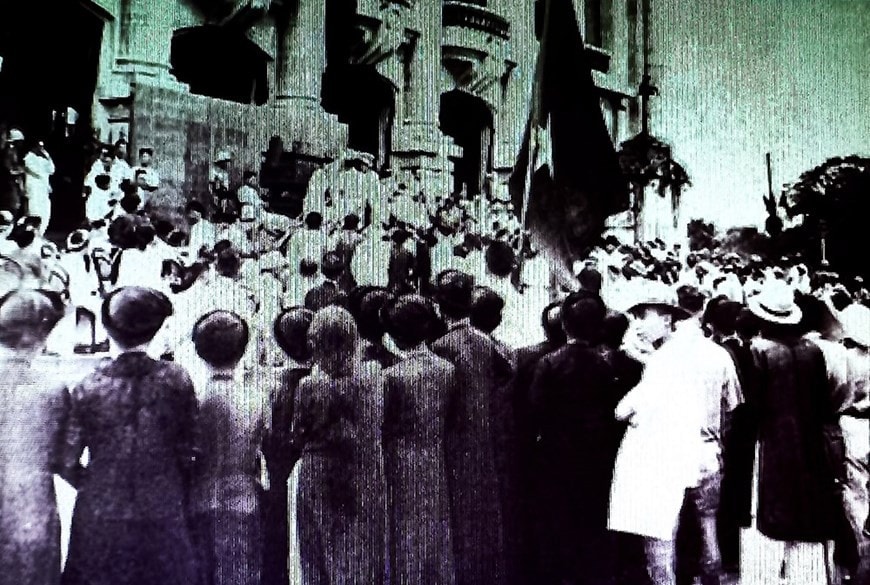
In just a short time, the people of the whole country donated 20 million dong and 370kg of gold. The enthusiastic and voluntary response of the people contributed to solving the financial difficulties of the country at that time, and had an extremely great significance for the newly gained national independence.
The sacred voice of compatriotism
Ho Chi Minh raised the national sentiment and compatriotism to the level of revolutionary ideology in the nation's immortal manifesto, becoming the strength of the times. In his role as the leader of the entire nation, he spoke for millions of Vietnamese people - those who shared the same bloodline of Lac Hong, who had suffered colonial oppression, who had risen up to fight, and now shared the desire for independence.
In every word of the Declaration, patriotism is deeply blended with compatriot morality, expressing the noble humanitarian ideology: no one is left behind but together, side by side, creating the strength of the entire nation in the journey to gain and maintain independence.
Throughout the text of the Declaration of Independence, along with the nine uses of the word"our people", Ho Chi Minh used the word 3 times"compatriots"without using words"people"(once the User used the phrase"the people of our country"), although the word “people” has a more formal, administrative connotation, often appearing in political texts of national and international nature.
As a person who always clearly defined the audience, purpose and writing style before writing, it can be clearly seen that President Ho Chi Minh carefully considered and pondered each sentence and each word. He understood that the word "compatriot" was deeply ingrained in the subconscious of the Vietnamese people, and when uttered, it would immediately bring about a strong inspiration, deeply touching the listeners' emotions, arousing and gathering the pride and kinship of all Vietnamese people.
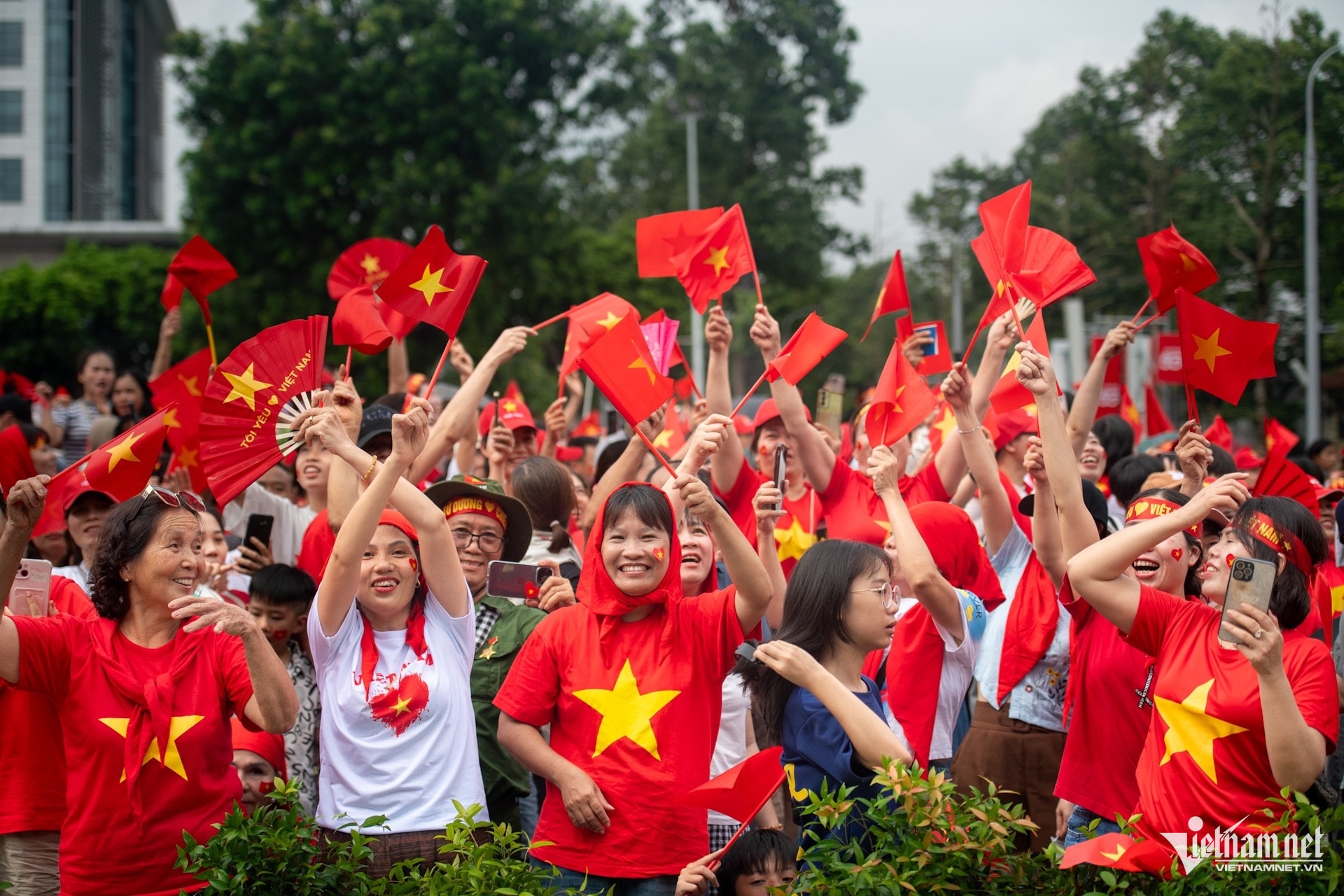
The atmosphere of Independence Day September 2, 1945 proved that just one word"compatriots"This simple yet sacred act brought the great leader to all the masses like a blood relative, eliminating the distance and boundary between the leader and the masses, creating empathy and a deep emotional connection between the listener and the speaker.
In his memoir “Unforgettable Years”, General Vo Nguyen Giap recounted that unforgettable moment:“The Old Man’s voice echoed the voice of a Nghe An countryside. That was how Uncle Ho appeared before a million compatriots that day. His words were calm, warm, concise, and clear. It was not the eloquent voice one usually hears on solemn holidays. But one could immediately find deep emotions and a resolute will there; everything was full of vitality; each sentence, each word touched people’s hearts. Halfway through reading the Declaration of Independence, Uncle Ho stopped and suddenly asked:
- I said, do you hear me?
A million people responded in unison, their voices resounding like thunder: - Co.o.ó!
From that moment, Uncle Ho and the whole sea of people became one.
Community cohesion is demonstrated in Ho Chi Minh's listing of the crimes of French colonialism not only against one class, but against all social strata:“They built more prisons than schools”, “They robbed us of our land, forests, mines, and raw materials”, “They monopolized the printing of banknotes, exports, and imports”, “They imposed hundreds of unreasonable taxes, making our people, especially farmers and merchants, impoverished”, “They did not allow our bourgeoisie to become rich”, “They exploited our workers in an extremely cruel way”.... This listing shows that all classes of people suffer, and therefore, everyone has the right and responsibility to stand up for independence.
This is the Declaration of Independence of the Democratic Republic of Vietnam after an 80-year struggle by the nation.
These are also heartfelt and emotional words from the most enlightened vanguard of the most revolutionary class, whose sons are absolutely loyal to the interests of the class and the nation, who, before the guillotine and the enemy's guns, tore off the black blindfold and shouted loudly:"Long live independent Vietnam!".
So when writing“The entire Vietnamese people are determined to devote all their spirit and strength, their lives and property to maintaining their freedom and independence.”President Ho Chi Minh did not use“we”, “state”,good"government"but is"all Vietnamese people"
Or when asserting:“We believe that the Allied countries, which have recognized the principles of national equality at the Tehran and San Francisco conferences, cannot but recognize the independence of the Vietnamese people.”He did not speak on behalf of a group of people in power, but on behalf of the national collective, that is, all "compatriots" who rose up to drive out Japanese fascists and French colonialists.
This expression is both representative - supreme power belongs to the people, meaning compatriots are the moral foundation of the right to national self-determination - and community-bonding, expressing the ideology."All Vietnamese people are brothers and sisters, sharing the same responsibility before the country."true to the spirit of solidarity that has existed for thousands of years.
This is a politically astute move, helping to consolidate the legitimacy and national character of the new government. In the context after the August Revolution, Vietnam faced the risk of being intervened by foreign forces again, so consolidating and promoting the strength of national unity was a prerequisite to protect independence.
The Declaration of Independence, by arousing the kinship between the people, served as a historical call to arms, strengthening the people's confidence in a new regime - a regime of the people, by the people, and for the people.
At the same time, it is also a sharp political message sent domestically and internationally: Vietnam is a sovereign nation, with a united people, a tradition of patriotism, heroic resistance against foreign invaders, and cannot be subdued. Any force that violates Vietnam's independence is unjust and will encounter resistance from the entire people, and will be overwhelmed by the extremely strong and enormous wave of patriotism of the Vietnamese people.
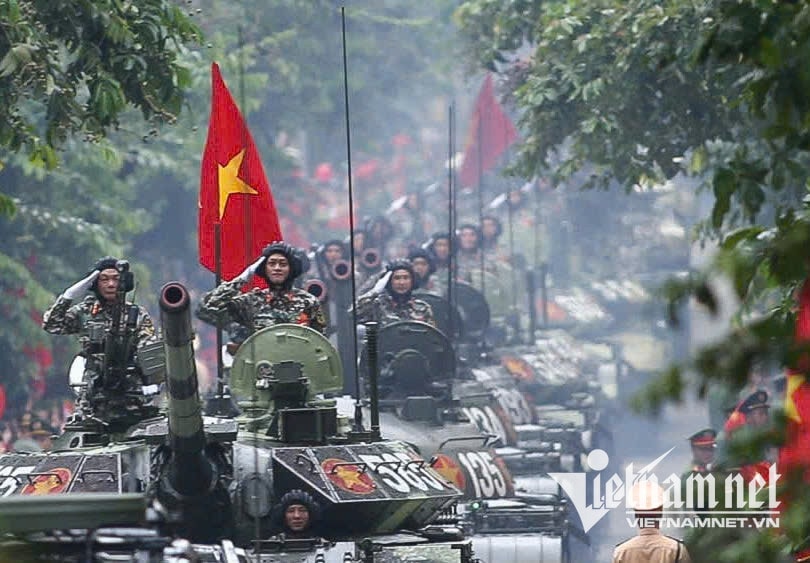
The Declaration of Independence is short, simple, and strong, with the power to encourage, motivate, and organize forces extremely strongly. In the sacred moment of the entire nation, each sentence and each word in the great national founding document quickly permeated deeply into the hearts of the people, strongly arousing the spirit of patriotism, national pride, self-respect, indomitability, and resilience of the Vietnamese people; it is a command to stir up the fighting spirit with the strength of revolutionary heroism and intelligence of the Vietnamese people with a will"resolutely devote all spirit and strength, lives and property to maintain that freedom and independence."
80 years have passed, but President Ho Chi Minh's sacred call on Independence Day, September 2, 1945, remains relevant forever.
From the spirit of patriotism, national pride, and solidarity, the Vietnamese people have steadfastly overcome many challenges in the 20th century. And until now, the strength of solidarity and humanity continues to be promoted so that the Vietnamese people can enter a new era of development - an era of wealth, civilization, and prosperity.

